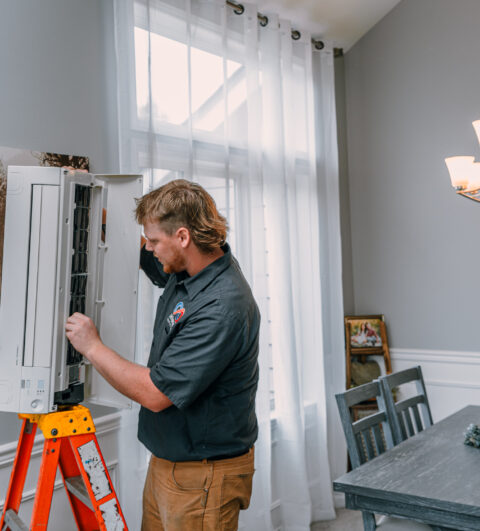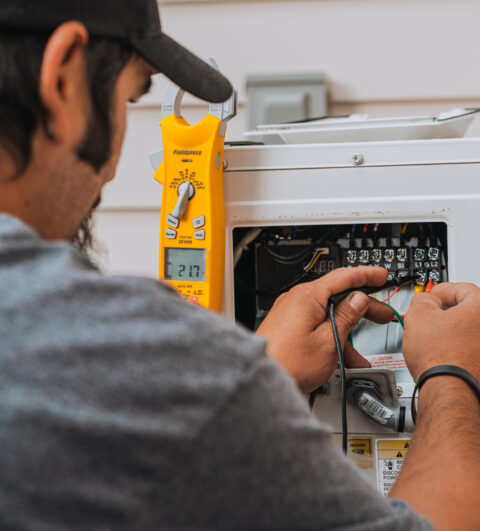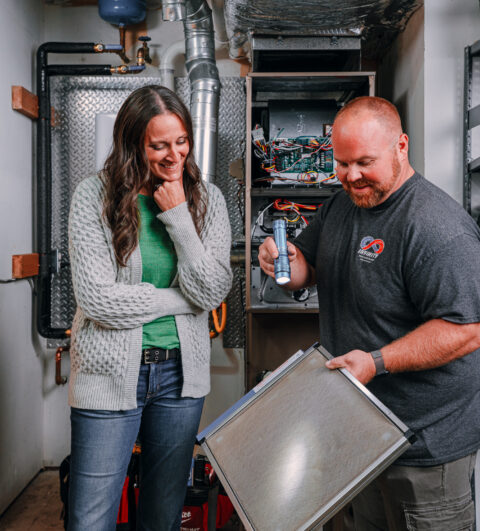Though all HVAC systems are designed to keep homes warm in the winter time, extremely low temperatures can pose a challenge for some. When temperatures drop, you should be able to count on your system to provide consistent warmth and long-term reliability without a thought. So how do you know what will work for you?
Whether you’re upgrading your current home or building a new one, understanding your options is a huge priority. In this article, we’ll explore each type of HVAC system and what they bring to the table, so that you can make the most well-informed decision possible. Let’s get started!
HVAC Efficiency in Cold Climates: What Makes or Breaks a System?
When choosing a HVAC system in any climate–but especially in areas prone to freezing–there are three factors that should be considered. Efficiency, heating capacity, and energy consumption are some of the biggest considerations that you should be taking when looking for an HVAC system that will support your needs in the cold. Here’s what you need to know:
SEER and HSPF Ratings–The Seasonal Energy Efficiency Ratio (SEER) measures cooling efficiency, while Heating Seasonal Performance Factor (HSPF) indicates heating efficiency. In cold climates, a high HSPF rating is essential for heat pumps. If you live in an area with consistently cold winters, choosing a heat pump with a high HSPF (10 or above) and a moderate to high SEER (16+) is our recommendation to ensure year-round performance while keeping energy bills manageable.
Fuel Type & Availability–Some areas have access to natural gas, making gas furnaces a great option, while others rely on electric heat pumps or boilers. Keep your unique surroundings in mind when considering your options.
System Design–Homes with existing ductwork may benefit from central air conditioners and furnaces, while homes without ducts can opt for ductless mini split systems.
Top Heating Systems for the Cold
Natural Gas Furnaces
Gas burning systems are the most common and reliable heating systems for cold weather. They work simply, burning natural gas to produce heat that is then sent through the duct system.
Why Choose a Gas Furnace?
- Highly efficient–Many modern models boast efficiency ratings above 95%.
- Reliable in extreme cold–Unlike some heat pumps, gas furnaces don’t struggle in sub-zero temperatures.
- Lower energy bills–Natural gas is often more cost-effective than electricity.
Best for Homeowners Who:
- Have access to natural gas
- Need consistent and powerful heat throughout the home
- Want a long-lasting and dependable solution
Boilers
Less common than natural gas furnaces, boilers work by circulating steam or hot water through radiators or underfloor heating systems.
Advantages of Boilers:
- Even, radiant heat–Unlike forced air systems, boilers don’t dry out indoor air.
- Energy-efficient–High-efficiency models reduce energy bills.
- Less maintenance–No ductwork means fewer air leaks and inefficiencies.
Ideal for Homes That:
- Prefer radiant heating over forced air
- Want quiet and efficient operation
- Have existing hydronic heating infrastructure
Air Source Heat Pumps with Secondary Heating
These systems are simply your standard heat pump, which works well in mild conditions, but may need the help of a secondary heating device, like a gas furnace or electric coil backup in the face of extremely cold temperatures. They work by extracting heat from the air outside, but as you might guess, do not work when there is little to no heat to extract.
Pros of Air Source Heat Pumps:
- Efficient HVAC solution for mild to moderately cold climates
- Provide both heating and cooling, replacing an AC unit in summer
- Lower energy consumption than traditional furnaces
Best for Homeowners Who:
- Experience moderate winters (above 20°F)
- Want a dual-purpose system for heating and cooling
- Have higher electricity costs but no access to natural gas
Ground Source (Geothermal) Heat Pumps
Made specifically for cold climates, geothermal heat pumps use underground pipes to extract heat from the ground, making them one of the most energy efficient systems.
Why Geothermal?
- Unmatched energy efficiency–Can reduce heating costs by up to 50%.
- Works in extreme cold–Unlike air-source heat pumps, performance doesn’t degrade in freezing temperatures.
- Long lifespan–Underground loops last 25+ years.
Best for Homeowners Who:
- Have space for underground installation
- Want long-term energy savings
- Can afford a higher upfront investment for lower energy bills
Dual Fuel Heat Pumps
A dual fuel heat pump is actually a combination of two different systems. Using both a gas furnace and a heat pump, dual fuel heat pumps automatically switch between their two systems for maximum efficiency.
Benefits of Dual-Fuel Systems:
- Optimized performance–Uses the heat pump in mild weather and the furnace in extreme cold.
- Reduces overall heating costs.
- Environmentally friendly–Reduces fossil fuel consumption.
Best for Homeowners Who:
- Experience temperature swings from moderate to extreme cold
- Want a balanced approach to energy efficiency
- Need a system compatible with existing ductwork
What to Consider When Choosing Your System
Climate Severity & Duration
The colder the winter, the more important it is to choose a heating system that can handle extreme temperatures. Homes in areas that experience prolonged freezing conditions require a system with high heating capacity, such as a gas furnace, boiler, or geothermal heat pump. For regions with milder winters, a high-efficiency heat pump provides enough warmth in the cold months without compromising its cooling abilities in the summer.
Home Insulation & Air Sealing
A well-insulated home plays a significant role in maintaining indoor warmth and reducing energy consumption. Insulation in walls, attics, and floors, along with high-quality windows and doors, prevents heat loss and allows any heating system to operate more efficiently. Before upgrading an HVAC system, homeowners should consider examining insulation for potential flaws, and sealing air leaks. These extra steps help in enhancing overall performance and lowering energy bills.
Ducted vs. Ductless Options
The presence of ductwork in a home is a key factor in determining which type of HVAC system is best. Homes with existing duct systems can benefit from central air conditioners, gas furnaces, or heat pumps, all of which distribute air efficiently through vents. In contrast, homes without ductwork may find ductless mini split systems to be a practical solution, offering zoned heating and cooling without the need for extensive renovations.
Energy Efficiency & Costs
Upfront costs and long-term energy efficiency should both be considered when selecting an HVAC system. While high-efficiency furnaces and heat pumps may require a larger initial investment, they can significantly reduce monthly energy bills and provide savings over time. Homeowners should evaluate available rebates, utility costs, and efficiency ratings to determine which system offers the best balance between affordability and long-term performance.
Finishing Up
Selecting the best HVAC system for cold climates depends on your home’s design, budget, and heating needs. Whether you opt for a gas furnace, heat pump, boiler, or geothermal system, the right choice will provide long-lasting comfort and efficiency.
Why Choose Infinity Heating and Air?
At Infinity Heating & Air, we specialize in efficient HVAC solutions tailored to Western Washington homeowners. With our expert installation, maintenance, and whole-home comfort solutions, we ensure your heating system runs at peak performance all season long. Whether you need a new heating system, heat pumps installed, or an energy-efficient upgrade, our team is here to help. Contact Infinity Heating & Air today to schedule a consultation and enjoy reliable warmth and energy savings all winter long.





